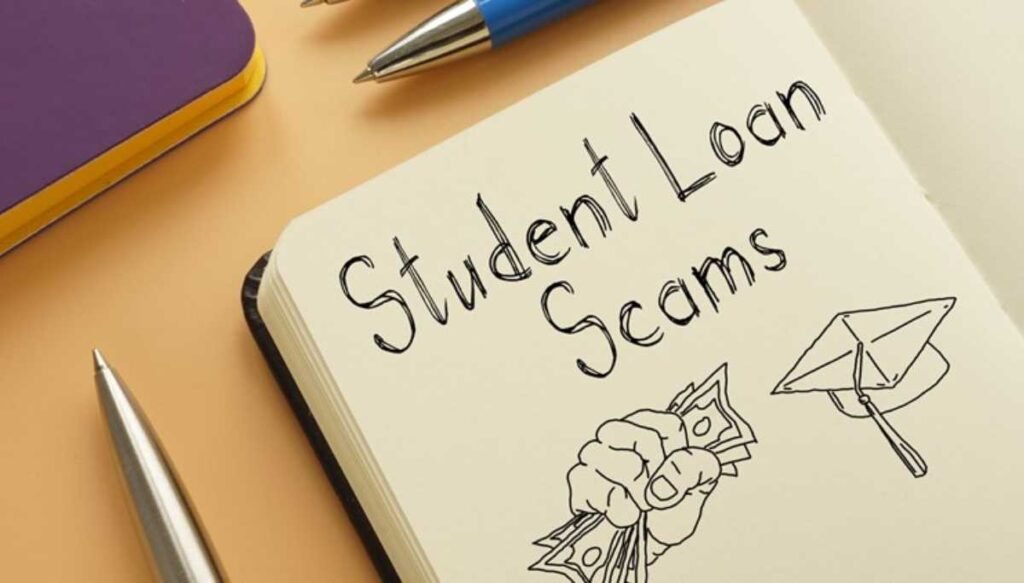- 1.1 Recognizing the Red Flags
- 1.2 Upfront Fees
- 1.3 Promises of Immediate Loan Forgiveness
- 1.4 Misrepresentation of Relationship with the Government
- 1.5 Effectively Avoiding Scams
- 1.6 Self-Education and Awareness
- 1.7 Verifying Credibility
- 1.8 Secure your Personal Information
- 1.9 Reporting Suspected Scams
- 1.10 Federal Trade Commission (FTC)
- 1.11 Consumer Financial Protection Bureau (CFPB)
- 1.12 The Long-Term Approach to Student Loan Forgiveness
- 1.13 Public Service Loan Forgiveness (PSLF)
- 1.14 Income-Driven Repayment Plans (IDR)
It is of utmost importance to safeguard yourself from fraudulent activities, especially when they pertain to financial matters. In this article, we will explore student loan forgiveness scams, how to recognize them, and effective measures to avoid becoming a victim.
How to Recognize Student Loan Forgiveness Scams
Recognizing the Red Flags
The initial step in staying protected is to comprehend the signs that hint at a scam. Certain red flags can help you discern these deceitful practices.
Upfront Fees
Any organization that requests upfront fees for loan forgiveness services is likely, not legitimate. Such services typically are provided free by the federal government or your loan servicer. Always remember that no legitimate company can guarantee your loans will be forgiven.
Promises of Immediate Loan Forgiveness
Beware of organizations that promise immediate loan forgiveness. There’s no such thing as an instant discharge of your student loans. The forgiveness process through the U.S. Department of Education takes time and requires diligent paperwork.
Misrepresentation of Relationship with the Government
Organizations claiming a unique or exclusive relationship with the U.S. Department of Education are more often than not fraudulent. The Department of Education does not affiliate with or endorse any private company for loan forgiveness.
Effectively Avoiding Scams
Understanding deceptive practices is a significant step towards scam protection. Knowing what to look for in terms of misleading practices can prove beneficial.
Self-Education and Awareness
Understanding the policies around student loans is critical. The official Federal Student Aid website is a reputable source for updated and accurate information. Also, know your rights as a borrower.
Verifying Credibility
Research companies before sharing your personal or financial details. A quick online search can reveal a wealth of information about a company’s credibility.
Secure your Personal Information
Your personal data is a valuable asset. Make sure to protect it. Avoid sharing sensitive information over phone calls or emails without ensuring the recipient’s legitimacy.
Reporting Suspected Scams
If you suspect you’re being targeted by a scam, report it immediately. Various platforms exist to assist you.
Federal Trade Commission (FTC)
The FTC investigates complaints of deceptive or unfair business practices. Their online Complaint Assistant makes reporting suspected scams straightforward.
Consumer Financial Protection Bureau (CFPB)
The CFPB is another excellent resource. File a complaint online if you feel you have been the victim of a scam or fraudulent activity.
The Long-Term Approach to Student Loan Forgiveness
While scams may promise a quick fix, the legitimate way to loan forgiveness is a long-term process. Public Service Loan Forgiveness (PSLF) and Income-Driven Repayment Plans (IDR) are authentic, albeit lengthy, routes to consider.
Public Service Loan Forgiveness (PSLF)
This option is for borrowers who are employed full-time by a U.S. federal, state, local, or tribal government or not-for-profit organization. It forgives the remaining balance on your Direct Loans after you have made 120 qualifying payments under a qualifying repayment plan.
Income-Driven Repayment Plans (IDR)
These plans cap your monthly student loan payment at a percentage of your discretionary income. After a specified period, typically 20-25 years, any remaining loan balance is forgiven.
Financial Literacy: A Crucial Tool
In your journey to protect yourself against student loan forgiveness scams, financial literacy becomes a pivotal tool. This knowledge empowers you to make informed and effective decisions about your resources, particularly in regards to student loans.
- Financial literacy is more than understanding how money works; it involves the ability to use that knowledge to manage personal finances effectively. This knowledge spans various aspects such as budgeting, understanding interest rates, and debt management.
- Financial literacy can be fostered through various mediums. Numerous online resources provide valuable insights on managing personal finances. Websites such as the National Financial Educators Council and the Financial Literacy and Education Commission offer free tools to improve your understanding of personal finances. Additionally, some universities offer courses and seminars to promote financial literacy among students.
- Enhancing financial literacy can help you understand the policies of student loans better. Moreover, a sound financial understanding allows you to critically evaluate offers from companies and determine if they’re scams or not. Therefore, promoting financial literacy can significantly aid in recognizing and avoiding student loan forgiveness scams.
Importance of Open Communication
Communication plays a key role in safeguarding against scams. Whether it’s staying updated about the latest scams or discussing suspicions with trusted individuals, open communication channels are essential.
- Staying informed about current scam tactics helps in preemptively recognizing fraudulent activities. News outlets, official government websites, and financial literacy blogs often provide updates about common scams and ways to protect against them.
- Discussing your student loans with trusted individuals can provide a new perspective and potential red flags. Open communication about your financial matters with your family, friends, or financial advisor can bring to light aspects that you might have overlooked.
- In cases of suspicion or uncertainty, direct communication with your loan servicer or the U.S. Department of Education can provide clarity. These organizations can validate the legitimacy of any claims about your student loans. Hence, promoting open communication can serve as an additional safeguard against student loan forgiveness scams.
The Bottom Line
In closing, recognizing and avoiding student loan forgiveness scams requires a proactive approach. Through financial literacy, verifying credibility, and maintaining open communication channels, you can protect yourself from these fraudulent activities. Always remember, when it comes to student loans, knowledge is indeed your greatest asset.
